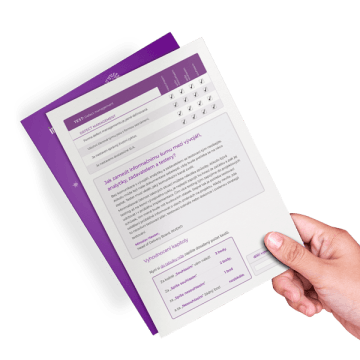What Does Your Competition Know About Software Development That You (Maybe) Don't?

The development of your software solution should be a direct link on the axis of the development team – user. There will be needs of your customers and also internal processes for which you will find a suitable software solution, and apply the technology to ensure that the user is satisfied and the goals are met.
In reality, however, we often encounter various obstacles and challenges and the path is often not as straightforward as we would like. Sometimes it's necessary to shift into reverse, pause and start looking for a new way forward. Efficiency and speed to successfully reach the goal can then be brought by an often underestimated part of the process – testing.
"Unfortunately, the reality is that most transformations are not successful. As statistics show, approximately 70% of large-scale transformation attempts fail to achieve their goals."
as stated byMcKinsey (2016).
Quality testing starts with a quality strategy
To have a well-defined testing strategy and goals precisely set is key. Those who can accurately define goals will be able to allocate budget effectively and save time and money on temporary and/or ineffective solutions. Your team will thank you for it! You'll definitely want to pamper your team because as Tomek Bujok, founder of No Fluff Jobs, aptly noted, the IT industry knows no unemployment, and if employees don't like it at a company, they can probably find another and better employer within two days (Houser 2021).
There are certainly more benefits of properly set up testing, but hand on heart... Do you pay enough attention to its audit and subsequent optimization?
Who needs a testing audit?
Anyone who wants to continuously push their development forward, optimize and look for opportunities to improve! Your testing team can gain up to 15% extra time by auditing testing and then applying corrective solutions. The added benefit is therefore increasing and freeing up the entire team's capacity. This will give its members room for additional projects or even self-development.
Your competitors know that keeping an eye on your why and how in testing is a "must have" on the road to success. By auditing your testing, you can determine its current state, but also its potential. Finding out the vitality of testing is not the only thing you can find out when you conduct a deeper analysis of your testing processes. With an audit, you can also take care of:
- Identification of areas that you can focus training on to increase the know-how of your team.
- Satisfaction in the team.
- Investing in testing and finding appropriate avenues.
- Ensuring better quality input from other teams through well set up testing.
- Having to acquire new hardware or software and setting up a process to use it.
- Freeing up the hands of the testing team to start focusing on areas that have been neglected for the time being.
Quality testing = satisfied users
If it's crucial to maintain positive user feedback, then with an audit, you can also positively influence costs even in other departments such as marketing. For example, for customer applications with under-appreciated testing, the effort spent on regaining customer trust can be translated into numbers. You have to make up for one negative review with forty positive ones. This puts a strain not only on your development team, but also on marketing and sales.
A test audit allows you to identify weaknesses at a time like this. And by optimizing them, you'll start testing and developing more efficiently. Users will give you the extra star for faster and more reliable app updates.
"Did you know that for every negative review, you need at least 40 positive reviews to make customers believe in your product again? So, it's worth remembering that you can only make one first impression, and getting the testing and its audit right can help you there too."
(Source: inc.com)
How long does an audit take?
If you are serious about the audit, expect at least 10 days of work. Even if this seems like a lot of time, sooner or later you will reach a point in your development where you can't avoid performing it – so it's worth taking your time and saving yourself a lot of time, expense and frustration up front.
How does a testing audit work?
At INVENTI, we always try to get to know the project in detail through documentation, meetings and test scenarios. Sometimes we even become a temporary part of the team. After analyzing the findings, we suggest several possible ways to fix the issue. The final step is the actual implementation of the corrections and planning future steps leading to greater efficiency. With us, you can prepare for a full audit of your testing before your competitor does.
Our new Guidebook: Step-by-Step Testing Audit effectively explains the whole process step by step in bullet points and with examples from real projects that our team has been through in the past. Whatever stage of software development you are planning to audit your testing, the guidebook will give you an overview of best practices and tips proven by the internationally recognized ISTQB methodology. To date, we have helped our partners implement dozens of projects in more than five European countries.
Guidebook:
Step-by-Step Testing Audit
We've compiled 10+ years of our own software testing experience into a clear guide full of practical advice and practices.

Guidebook:
Step-by-step
Testing Audit

